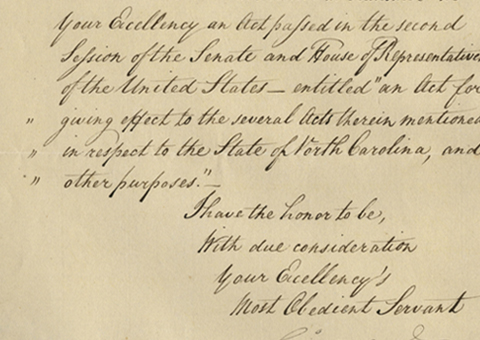Sold – The Continental Congress Warns Three States to Be Prepared for a British Military Operation

The minutes of Congress were sent to New York, Connecticut and Rhode Island; Connecticut proved to be the target of an impending raid.
Secretary of the Continental Congress from 1774-1789, he kept records of its proceedings and notes of its debates. It was also his responsibility to make official copies of resolutions and documents, and see to it that they were forwarded to the recipients Congress intended. Just such an occasion arose in 1779 when...
Secretary of the Continental Congress from 1774-1789, he kept records of its proceedings and notes of its debates. It was also his responsibility to make official copies of resolutions and documents, and see to it that they were forwarded to the recipients Congress intended. Just such an occasion arose in 1779 when Congress was alerted to British maneuvers in the area of Long Island Sound, and determined to issue a warning to the states that might potentially be threatened.
Document Signed, Philadelphia, Pa., June 25, 1779, consisting of a resolution adopted “In Congress, June 22, 1779,” informing New York, Connecticut and Rhode Island of the impending danger. “Resolved, that it be recommended to the Legislative and Executive powers in the several states, more especially those that are adjacent to Long Island and other places in possession of the enemy to take the most effectual measures to prevent plundering the inhabitants of such places, and all officers of the army are directed to use their utmost exertions to prevent such practices.”
This is labelled “Extract from the Minutes;” a docket on the verso indicates that this was the copy sent to Rhode Island and was for the purpose of “Preventing plundering inhabitants.” Congress’s information proved to be accurate. From July 4-11, there was a large-scale raid on the Connecticut coast (on Long Island Sound) commanded by General William Tryon, the last royal governor of New York. Congress’s warning in this document had gone unheeded or arrived too late; Tryon, with force of 2,600 men, first struck New Haven, which had only a 150-man patriot militia to oppose him. The Americans proved unable to stop the British from burning a number of homes and ships in the harbor. The towns of Fairfield, Norwalk, and Green’s Farms received similar treatment. At Norwalk, Tyron sat on the hill and watched the houses burn.

Frame, Display, Preserve
Each frame is custom constructed, using only proper museum archival materials. This includes:The finest frames, tailored to match the document you have chosen. These can period style, antiqued, gilded, wood, etc. Fabric mats, including silk and satin, as well as museum mat board with hand painted bevels. Attachment of the document to the matting to ensure its protection. This "hinging" is done according to archival standards. Protective "glass," or Tru Vue Optium Acrylic glazing, which is shatter resistant, 99% UV protective, and anti-reflective. You benefit from our decades of experience in designing and creating beautiful, compelling, and protective framed historical documents.
Learn more about our Framing Services






































































































